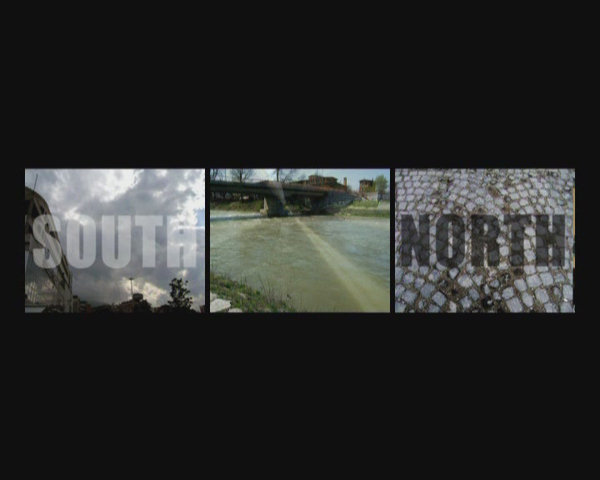The Renaming Machine
dal 21/4/2010 al 21/5/2010
Segnalato da
Magnus Bartas
Zdenko Buzek
Liljana Gjuzelova
Igor Grubi
Dejan Habicht
Tanja Lazetic
Kalle Hamm
Albert Heta
Sasha Huber
Hristina Ivanoska
Sanja Ivekovic
Monument Group
Oliver Musovik
Dan Perjovschi
Lia Perjovschi
Tadej Pogacar
Dejan Spasovik
Saso Stanojkovik
Aneta Vangeli
Suzana Milevska
21/4/2010
The Renaming Machine
Open Space - Zentrum fur Kunstprojekte, Wien
The project looks at the complex entanglements involved in the political and cultural processes of renaming. The exhibition consists of an archive divided in three programmes and other conference and performance documents that either pre-existed or were accumulated as results of the newly commissioned research projects. Participant artist: Magnus Bartas, Zdenko Buzek, Liljana Gjuzelova, Igor Grubic, Dejan Habicht/Tanja Lazetic, Kalle Hamm, Sasha Huber, Hristina Ivanoska, Dan Perjovschi, Lia Perjovschi...

curated by Suzana Milevska
Participant artist:
Magnus Bärtås | Zdenko Buzek | Liljana Gjuzelova | Igor Grubic | Dejan Habicht/Tanja Lazetic
| Kalle Hamm | Albert Heta | Sasha Huber | Hristina Ivanoska | Sanja Ivekovik | MONUMENT
Group | Oliver Musovik | Dan Perjovschi | Lia Perjovschi | Tadej Pogacar | Dejan Spasovik |
Saso Stanojkovi | aneta Vangeli
The project The Renaming Machine looks at the complex entanglements involved in the political and
cultural processes of renaming. Its main concept reflects the crucial need to question the way these
processes have influenced the construction and destabilization of the memory of national, cultural and
personal identities in the former Yugoslavia and South-Eastern Europe over the past two decades.
The project examines various artistic and cultural phenomena, strategies and research formats of work
associated with the notion of “renaming” in order to determine the extent to which renaming affects
visual culture and shapes the cultural identities and cultural politics in the region and elsewhere.
The exhibition consists of an archive divided in three programmes and other conference and
performance documents that either pre-existed or were accumulated as results of the newly
commissioned research projects.
The Renaming Machine underscores the arbitrary and contingent nature of names. Alongside the
philosophical and theoretical implications of the “mystic writing pad” of historic renaming, the project
examines clandestine ideological patterns of the “desiring renaming machine” at work behind the
dominant and visible social machines. As a region overburdened with changes in its state borders, the
Balkans, for example, possess a history that abounds with the politics of renaming.
Particularly with the break-up of Yugoslavia, the renaming “apparatus” erased and overwrote most
traces from the Tito era, including the Yugoslav leader’s own name, which had been attached to many
places in the former country. The region itself has been called by different names: the Balkans, the
Western Balkans, South-Eastern Europe, etc., depending on the geopolitical interests and attitudes
regarding its integrity or dismemberment. The “renaming machine” has also its profound implications
for gender politics in the way the patriarchal marriage contract has traditionally dictated that a woman
assumes her husband’s family name, thus overwriting her premarital identity.
Changes in the names of institutions, people, ethnicities, languages, toponyms and even states are
usually viewed as the first step in the process of appropriation, or erasure, of national, cultural, and
personal identities, as well as a way to protect long-term political interests and ensure the domination
over a territory. For example, the on-going conceptual “war of names” between Greece and
Macedonia (that in 1993 was forced by UNO to start using the description “The Former Yugoslav
Republic of Macedonia”) resulted in an international outwitting game. This case became the most
obvious example of complex ideology of renaming: how the endlessly postponed event of renaming
can enable a “state of exception” whereby the political and economical power of the “renaming
machine” is either underappreciated or overrated.
The Renaming Machine was imagined as a two-year umbrella project that comprised a series of
events: conferences, exhibitions, debates, video programmes, bloggers’ posts, etc. that take place in
Ljubljana, Skopje, Prishtina, Zagreb and Vienna. A comprehensive publication edited by the Skopje-
based curator, theorist and professor of art history Dr. Suzana Milevska. The book will be published by
the P.A.R.A.S.I.T.E. Institute as the culminating segment of the project.
The Zagreb exhibition included new commissions by: Albert Heta, Sanja Ivekovi , Tanja Ostoji /David
Rych, Tadej Poga ar, Dejan Spasovi and Alexander Vaindorf.
Lecture, Q/A: 23 April, 17.00 - 19.00 pm
Renaming: Identity Overwriting or Potential Agency by Suzana Milevska at Open Space
Opening 22 April, 2010, 19-21.30
Open Space - Zentrum für Kunstprojekte
Lassingleithnerplatz 2, A- 1020 Vienna
Open Friday, Saturday 13.00 - 18.30 and open for the rest of the week days by appointment only.
Admission free



